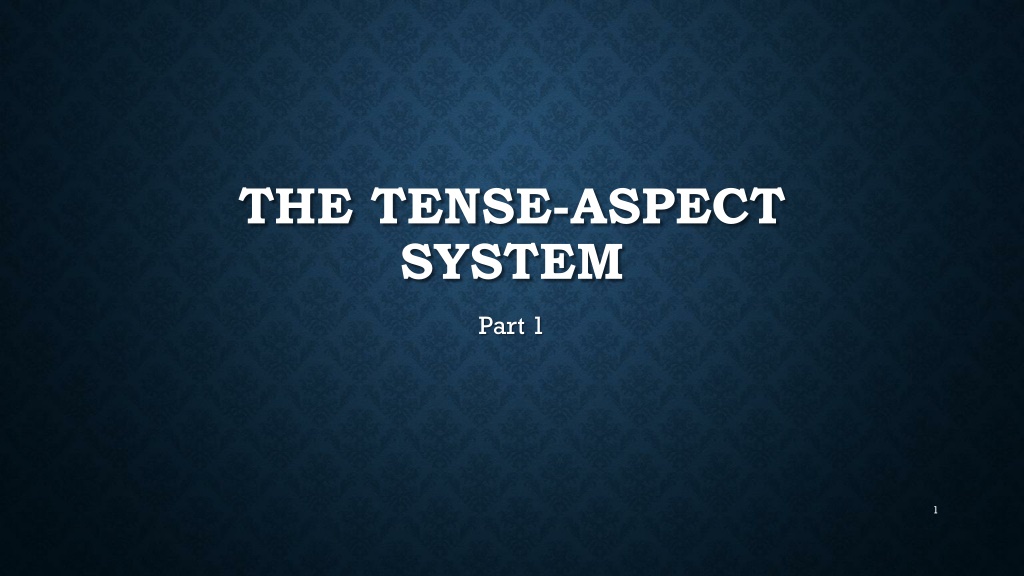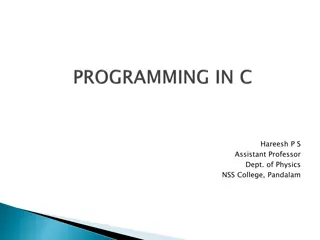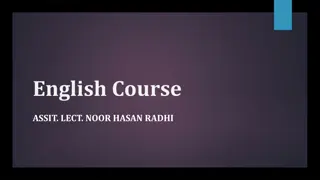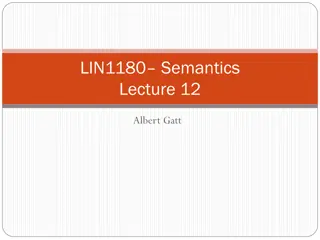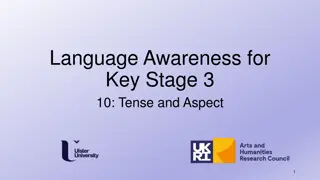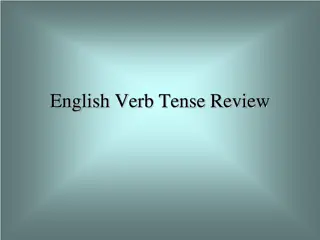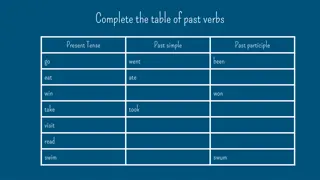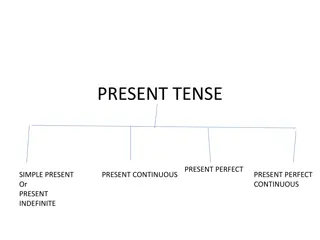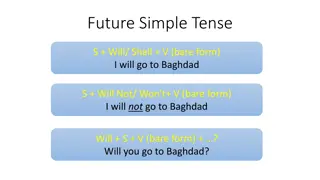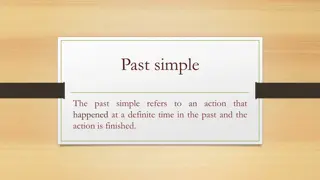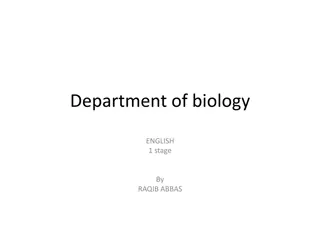Understanding the Tense-Aspect System in Different Languages
Exploring the complexities of the Tense-Aspect System across languages, this content delves into the nuances of tense formations, implications for ESL/EFL learners, and formal characteristics. The variations in language systems pose challenges for learners, emphasizing the need for comprehensive understanding and diligent effort in mastering the system.
Download Presentation

Please find below an Image/Link to download the presentation.
The content on the website is provided AS IS for your information and personal use only. It may not be sold, licensed, or shared on other websites without obtaining consent from the author. Download presentation by click this link. If you encounter any issues during the download, it is possible that the publisher has removed the file from their server.
E N D
Presentation Transcript
THE TENSE-ASPECT SYSTEM Part 1 1
AGENDA Definition of the Tense The differences in tense formations among different languages The implications the ESL/EFL students face when learning the system The matrix of the system The qualifications of the Tense-Aspect System Meaning in The Tense-Aspect System in details 2
DIFFERENCES IN TENSES AMONGST LANGUAGES Tense: Is a grammatical device for situating events, states, or actions in time. The way Humans divide time and represent it is different from one language to another The formation of certain common forms among the languages leads or overgeneralization or the opposite for ESL learners as French Speakers Some other languages as Chinese, Thai, Yoruba and Indonesian have no marker on the verb at all, instead, they used lexical mean to indicate time as yesterday to indicate past tense English has no explicit marking to future as there is in Latin or Turkish (-eceg-) Futurity in English is signaled by combination of different forms and contextual factors 4
The differences in the languages systems may leave a negative impact on their learning of the Tense-Aspect System in English Language teacher need do deal with meaning , use and the forms at the sentential and suprasentential levels Since languages mapping form, meaning and use varies from one language to another, the ESL/EFL students need to put more efforts in mastering the English Tense-Aspect System 5
THE FORMAL CHARACTERISTICS OF THE TENSE-ASPECT SYSTEM Tenses 1. Simple present 2. Simple past 3. Simple future 4. Present perfect 5. Past perfect 6. Future perfect 7. Present progressive 8. Past progressive 9. Future progressive 10. Present perfect progressive 11. Past perfect progressive 12. Future perfect progressive example It breaks It broke It will break It has broken It had broken It will have broken It is breaking It was breaking It will be breaking It has been breaking It had been breaking It will have been breaking 6
In order to understand how the system works, this book deals with the respective elements of the system individually as Tenses and further combines them with the aspects Future is considered as a tense although there is no verb inflection of future time 7
THE TENSE-ASPECT COMBINATIONS IN ENGLISH Simple Perfect Aspect Tense Progressive Perfect Progressive Have+ -en Be + -ing Have+ -en be+ -ing Present write/writes walk/walks Has/have written has/have walked Am/is/are writing am/is/are walking Has/have been writing has/have been walking Past Wrote walked Had written had walked Was/were writing was/were walking Had been writing had been walking Future Will write will walk Will have written will have walked Will be writing will be walking Will have been writing Will have been walking 8
MEANING OF THE ENGLISH TENSE-ASPECT SYSTEM The dimension of meaning helps the students to manage the system The core meaning of the system indicates 3 main qualities 1. One meaning can have many forms 2. The tense or aspect meaning depends to certain extends on the meaning of the verb 3. One form can have many meanings 10
One meaning can have many forms Example of how future time is conveyed through different constructions: 11
The tense or aspect meaning depends to certain extends on the meaning of the verb English verbs are divided into two basic aspectual classes Perfective (have an end point) Ex. They built the house. Imperfective (no end point) Ex: He knows the truth The perfective verbs resist the simple present but take the progressive while the case is revered for imperfective verbs 12
One form can have many meanings a. If I walked home after the school today, it would take me all afternoon. b. They said they loved grammar. c.Host to guest: Did you want something to eat before the game? d.Sales clerk to customer: What is it that you wanted. 13
THE CORE MEANING OF THE TENSES WITH SIMPLE ASPECT Simple aspect in general indicates events that are conceptualized as complete wholes with no further development to be allowed. This aspect stands in contrast to the progressive aspect , which is incomplete and imperfective. Ex: They live in Turkey. They are living in Turkey. 14
SIMPLE PRESENT TENSE: (IMMEDIATE FACTUALITY) Application of the meaning Habitual actions in the present General timeless truths, such as the physical laws or costumes With be and other stative verbs to indicate state examples She studies every day. The water boils at 100 C. There is a large house in the corner. The car belongs to him. Now I understand. After he finishes the work, he ll do the errands. Inception of state In the subordinate clauses of time or condition when the main clause contains future-time verb Future expression when a scheduled event is involved, usually with a future-time adverbial Present event/action(usually in sporting events or demonstrations/procedures of some sort) Present speech acts (where the action is accomplished in the speaking of it) Conversational historical present (used to refer to certain past events in narration) I have a meeting tomorrow. Now he kicks the ball. I resign from this commission. 15 So he stands up and waves his arm.
SIMPLE PAST TENSE: (SENSE OF REMOTENESS) Application of the meaning examples completed event/action in the past I studied hard for the exam. Habitual or repeated action/event in the past It rained almost every day last winter. An event with duration that applied in the past with the implication that it no longer applies to the present She taught us grammar for 4 years. With state in the past He appeared to be a creative genius. Imaginative conditional in the subordinate clause If he took care of himself, he wouldn t be absent so often. Social distancing Did you want to sit down? 16
SIMPLE FUTURE TENSE: (COMPLETE EVENT) Application of the meaning examples An action to take place at some definite future time He will do the exam next week. A future habitual action or state or even present habits that are expected to continue into the future She will travel between the two cities every day. He will wake up, and before coming downstairs, he will start playing with his trains. A situation that may obtain in the present and will obtain in the future but with some future termination in sight She will live there until she improves her English. In the main clause of future conditionals If you go, you will be sorry. 17
SIMPLE TENSE ILLUSTRATE THE FACTUAL STATEMENT WHETHER THEY ARE SPECIFIC OR GENERAL 18
PERFECT ASPECT The core meaning of the perfect is prior . It is used in relation to some other point in time. Have you done your homework The past perfect offers a retrospective point of view on some past time He has left before I arrived. The future perfect offers a retrospective point of view on some future time. Mark will have finished all the chores by the time we get there. 19
PRESENT PERFECT Application of the meaning Example A situation that began at a prior point in time and continues into the present I have been a teacher since 1967 An action occurring at an unspecified prior of time that has current relevance I have already seen the movie. A very recently completed action He has just arrived home. An action that occurred over a prior time period and that is completed at the moment of speaking The value of the Johnsons' house has doubled in the last four years. With the verbs in subordinate clauses of time or condition She won't be satisfied until she has finished another chapter. 20
PAST PERFECT Application of the meaning Example An action completed in the past prior to some other past event or time She had already left before I arrived Imaginative conditional in the subordinate clause If sally had studied harder, she would have passed the exam. 21
FUTURE PERFECT Application of the meaning Example A future action that will be completed prior to a specific future time I will have finished all this work by 5PM. A state or accomplishment that will be completed in the future, prior to some other future time or event At the end of the summer, they will be married for 10 years. 22
PROGRESSIVE ASPECT The meaning of this aspect as being imperfective, meaning that it portrays an event in a way that allows for it to be incomplete or somehow limited Possibility and chance for change and/or development ex. They are living in Turkey. 23
Application of the meaning Example PRESENT PROGRESSIVE: (AN ACTIVITY IN PROGRESS) Extended present(action will end and therefore lacks the permanence of the simple tense) I m studying English Language at UoD. A temporary situation She is living with her parents. Repetition or iteration in a series of similar ongoing actions He is kicking the ball around the backyard. Express future (when an event is planned, usually with future time adverbial) She is coming tomorrow. A change in the progress She is becoming more and more like her mother. Emotional comment or present habit often reoccurring with frequency adverbs.(Subjective meaning ) He is always complaining about his manager s attitude. 24
PAST PROGRESSIVE Application of the meaning An action in progress at a specific point of time in the past Past action simultaneous with some other event that is usually stared in the simple past. The past progressive provides the background and the simple past provides the foreground Repetition or iteration of some ongoing past action Social distancing (which comes in the form of past tense and the tentativeness of the progressive aspect) Example He was running when he fell down. She was doing the dishes when the phone rang. He was coughing all night long. I was hoping you would lend me some money. 25
FUTURE PROGRESSIVE Application of the meaning Example An action that will be in progress at a specific time in the future A driver will be waiting for you when you arrive. Duration of some specific future action He will be working on his thesis for the next 2 years 26
PERFECT PROGRESSIVE ASPECT As the name indicates, this aspect combines the prior sense of the perfect with the meaning of incompleteness inherent in the progressive aspect: Ex: They have been working hard on their special project. 27
PRESENT PERFECT PROGRESSIVE Application of the meaning Example A situation or habit that began in the past and that continues up to the present and possibly to the future She has been going out with her friends. An action in progress that is not yet completed I have been reading this book. A state that changes over time The students have been getting better and better each week. A subjective, evaluative comment on something observed over time triggered by current evidence You have been drinking again! 28
PAST PERFECT PROGRESSIVE Application of the meaning Example An action or habit taking place over a period of time in the past, prior to some other past event or time She had been working hard, so her doctor told her to take a vacation, she had been trying to finish her degree that year. A past action in progress that was interrupted by a more recent past action We had been planning to vacation but changed our minds after receiving the brochure on Nova Scotia. An ongoing past action or state that becomes satisfied by some other event I had been hoping to see that play, so I was pleased when I won the tickets. 29
FUTURE PERFECT PROGRESSIVE Durative or habitual action that is taking place in the present and that will continue into the future until or through a specific future time ex: On Christmas Eve, we will have been living in the same house for 20 years. 30
END OF THE PRESENTATION PART 1 Q/A 32
